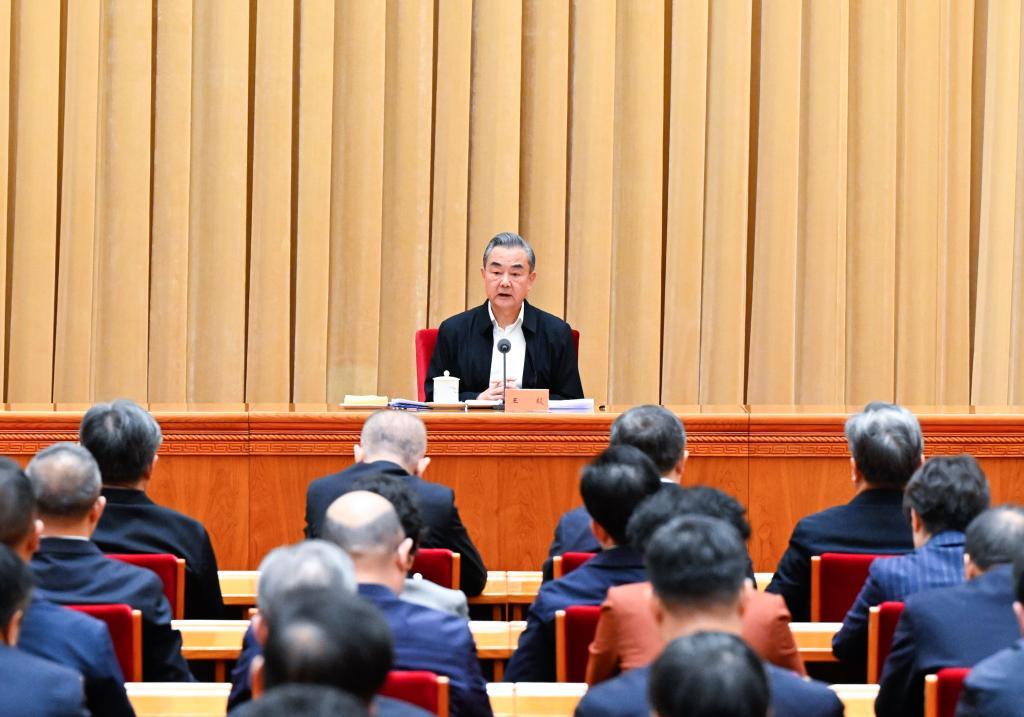We will stay firmly rooted in Chinese culture. We will collect and refine the defining symbols and best elements of Chinese culture and showcase them to the world. We will accelerate the development of China’s discourse and narrative systems, better tell China’s stories, make China’s voice heard, and present a China that is credible, appealing, and respectable.
中央外事工作會議在北京舉行 習近平發表重要講話
發佈時間:2023-12-29 08:57:25 | 來源:新華社 | 作者: | 責任編輯:丁素雲中央外事工作會議在北京舉行
習近平發表重要講話 李強主持
趙樂際王滬寧蔡奇丁薛祥李希韓正出席會議
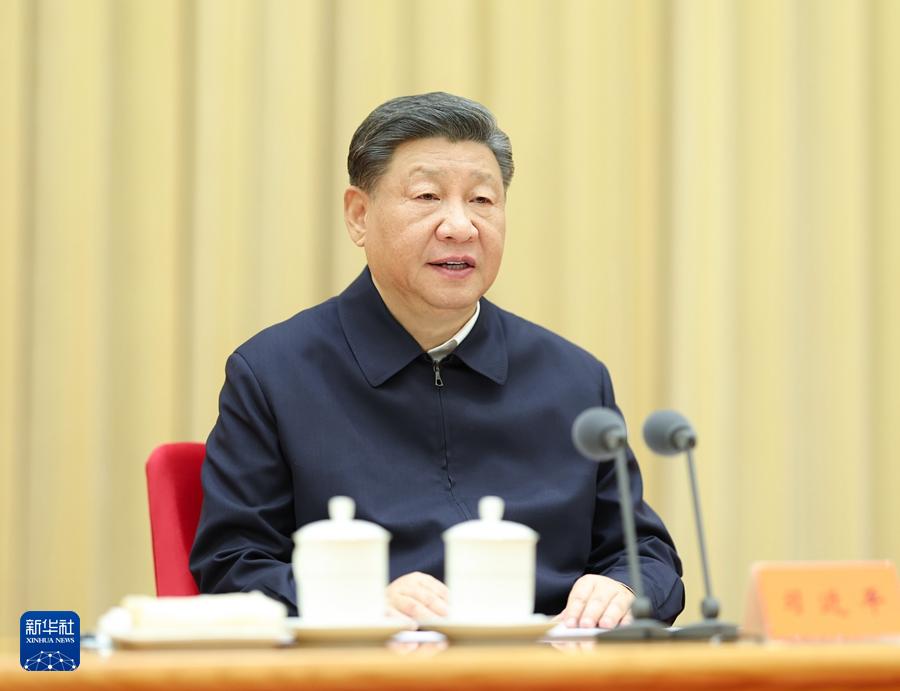
12月27日至28日,中央外事工作會議在北京舉行。中共中央總書記、國家主席、中央軍委主席習近平出席會議併發表重要講話。新華社記者 鞠鵬 攝
新華社北京12月28日電 中央外事工作會議12月27日至28日在北京舉行。中共中央總書記、國家主席、中央軍委主席習近平出席會議併發表重要講話。中共中央政治局常委李強、趙樂際、王滬寧、蔡奇、丁薛祥、李希,國家副主席韓正出席會議。
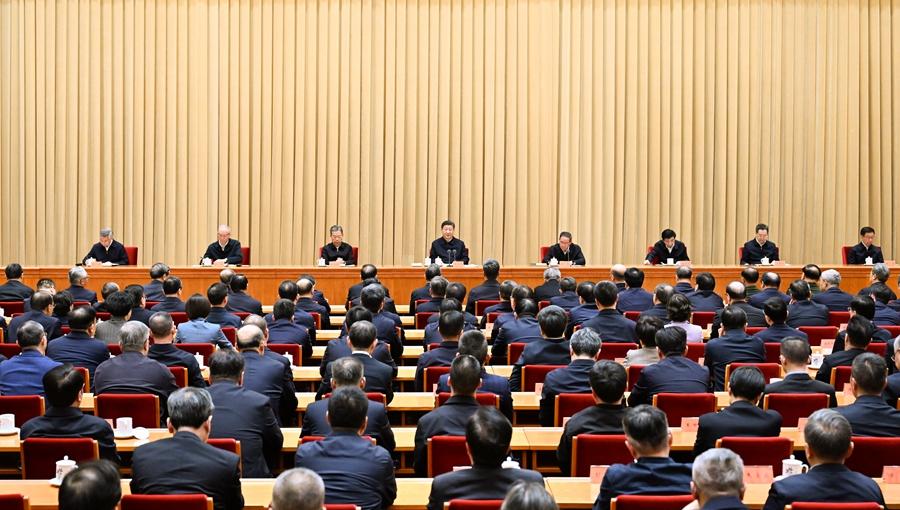
12月27日至28日,中央外事工作會議在北京舉行。中共中央總書記、國家主席、中央軍委主席習近平出席會議併發表重要講話。李強、趙樂際、王滬寧、蔡奇、丁薛祥、李希、韓正出席會議。新華社記者 謝環馳 攝
習近平在重要講話中系統總結新時代中國特色大國外交的歷史性成就和寶貴經驗,深刻闡述新征程對外工作面臨的國際環境和肩負的歷史使命,對當前和今後一個時期的對外工作作了全面部署。李強在主持會議時強調,要以習近平外交思想為指導做好新征程上的對外工作,並就學習領會和貫徹落實習近平總書記重要講話精神提出要求。
會議認為,黨的十八大以來,在推進新時代中國特色社會主義事業的偉大征程中,對外工作取得歷史性成就、發生歷史性變革。一是創立和發展了習近平外交思想,開闢了中國外交理論和實踐的新境界,為推進中國特色大國外交提供了根本遵循。二是彰顯了我國外交鮮明的中國特色、中國風格、中國氣派,樹立了自信自立、胸懷天下、開放包容的大國形象。三是倡導構建人類命運共同體,指明瞭人類社會共同發展、長治久安、文明互鑒的正確方向。四是堅持元首外交戰略引領,在國際事務中日益發揮重要和建設性作用。五是全面運籌同各方關係,推動構建和平共處、總體穩定、均衡發展的大國關係格局。六是拓展全方位戰略佈局,形成了範圍廣、品質高的全球夥伴關係網路。七是推動高品質共建“一帶一路”,搭建了世界上範圍最廣、規模最大的國際合作平臺。八是統籌發展和安全,以堅定意志和頑強鬥爭有效維護國家主權、安全、發展利益。九是積極參與全球治理,引領國際體系和秩序變革方向。十是加強黨中央集中統一領導,鞏固了對外工作大協同格局。
會議強調,新時代十年,我們在對外工作中經歷了不少大風大浪,戰勝了各種困難挑戰,開創了中國特色大國外交新局面,我國外交的戰略自主性和主動性顯著增強。我國已成為更具國際影響力、創新引領力、道義感召力的負責任大國。
會議指出,在新時代外交工作實踐中,我們積累了一系列寶貴經驗。必須做到堅持原則,在關乎人類前途命運和世界發展方向的重大問題上,要旗幟鮮明、站穩立場,牢牢佔據國際道義制高點,團結爭取世界大多數。必須體現大國擔當,堅持弘揚獨立自主精神,堅持引領和平發展,堅持促進世界穩定和繁榮。必須樹立系統觀念,以正確的歷史觀、大局觀把握大勢、統籌兼顧、掌握主動。必須堅持守正創新,堅守中國外交的優良傳統和根本方向,同時開拓進取,推動理論和實踐創新。必鬚髮揚鬥爭精神,堅決反對一切強權政治和霸淩行徑,有力捍衛國家利益和民族尊嚴。必鬚髮揮制度優勢,在黨中央集中統一領導下,各地區各部門協同配合,形成強大合力。
會議指出,世界大變局加速演進,世界之變、時代之變、歷史之變正以前所未有的方式展開,世界進入新的動蕩變革期,但人類發展進步的大方向不會改變,世界歷史曲折前進的大邏輯不會改變,國際社會命運與共的大趨勢不會改變,對此我們要有充分的歷史自信。
會議認為,展望未來,我國發展面臨新的戰略機遇。新征程上,中國特色大國外交將進入一個可以更有作為的新階段。要緊緊圍繞黨和國家中心任務,穩中求進、守正創新,堅定維護國家主權、安全、發展利益,開闢中國外交理論與實踐新境界,塑造我國和世界關係新格局,把我國國際影響力、感召力、塑造力提升到新高度,為以中國式現代化全面推進強國建設、民族復興偉業營造更有利國際環境、提供更堅實戰略支撐。
會議指出,構建人類命運共同體是習近平外交思想的核心理念,是我們不斷深化對人類社會發展規律認識,對建設一個什麼樣的世界、怎樣建設這個世界給出的中國方案,體現了中國共産黨人的世界觀、秩序觀、價值觀,順應了各國人民的普遍願望,指明瞭世界文明進步的方向,是新時代中國特色大國外交追求的崇高目標。新時代以來,構建人類命運共同體從中國倡議擴大為國際共識,從美好願景轉化為豐富實踐,從理念主張發展為科學體系,成為引領時代前進的光輝旗幟。概括地講,構建人類命運共同體,是以建設持久和平、普遍安全、共同繁榮、開放包容、清潔美麗的世界為努力目標,以推動共商共建共用的全球治理為實現路徑,以踐行全人類共同價值為普遍遵循,以推動構建新型國際關係為基本支撐,以落實全球發展倡議、全球安全倡議、全球文明倡議為戰略引領,以高品質共建“一帶一路”為實踐平臺,推動各國攜手應對挑戰、實現共同繁榮,推動世界走向和平、安全、繁榮、進步的光明前景。
會議指出,針對當今世界面臨的一系列重大問題重大挑戰,我們倡導平等有序的世界多極化和普惠包容的經濟全球化。平等有序的世界多極化,就是堅持大小國家一律平等,反對霸權主義和強權政治,切實推進國際關係民主化。要確保多極化進程總體穩定和具有建設性,就必須共同恪守聯合國憲章宗旨和原則,共同堅持普遍認同的國際關係基本準則,踐行真正的多邊主義。普惠包容的經濟全球化,就是順應各國尤其是發展中國家的普遍要求,解決好資源全球配置造成的國家間和各國內部發展失衡問題。要堅決反對逆全球化、泛安全化,反對各種形式的單邊主義、保護主義,堅定促進貿易和投資自由化便利化,破解阻礙世界經濟健康發展的結構性難題,推動經濟全球化朝著更加開放、包容、普惠、均衡的方向發展。
會議要求,當前和今後一個時期,對外工作要以習近平新時代中國特色社會主義思想特別是習近平外交思想為指導,對標中國式現代化目標任務,堅持自信自立、開放包容、公道正義、合作共贏的方針原則,圍繞推動構建人類命運共同體這條主線,與時俱進加強戰略部署,深化完善外交佈局,突出問題導向,運用系統思維,更加立體、綜合地明確外交戰略任務,以更加積極主動的歷史擔當、更加富有活力的創造精神,開創中國特色大國外交新局面。
會議指出,外交守正創新是新征程上開創中國特色大國外交新局面的必然要求,是更好支撐中國式現代化的必然要求。要加強思想理論武裝,深化體制機制改革,推動外交隊伍建設,不斷增強對外工作的科學性、預見性、主動性、創造性。
會議強調,必須毫不動搖堅持外交大權在黨中央,自覺堅持黨中央集中統一領導,進一步強化黨領導對外工作的體制機制。各地區各部門要胸懷大局、協同配合,不折不扣貫徹落實黨中央對外工作決策部署。
王毅作總結講話。中央宣傳部、中央對外聯絡部、商務部、中央軍委聯合參謀部、雲南省負責同志及常駐聯合國代表團代表作交流發言。
中共中央政治局委員、中央書記處書記,全國人大常委會有關領導同志,國務委員,最高人民法院院長,最高人民檢察院檢察長,全國政協有關領導同志出席會議。
中央外事工作委員會委員,各省、自治區、直轄市和計劃單列市、新疆生産建設兵團,中央和國家機關有關部門、有關人民團體、中央軍委機關有關部門,部分中管金融機構主要負責同志,駐外大使、大使銜總領事、駐國際組織代表等參加會議。
Central conference on work relating to foreign affairs held in Beijing
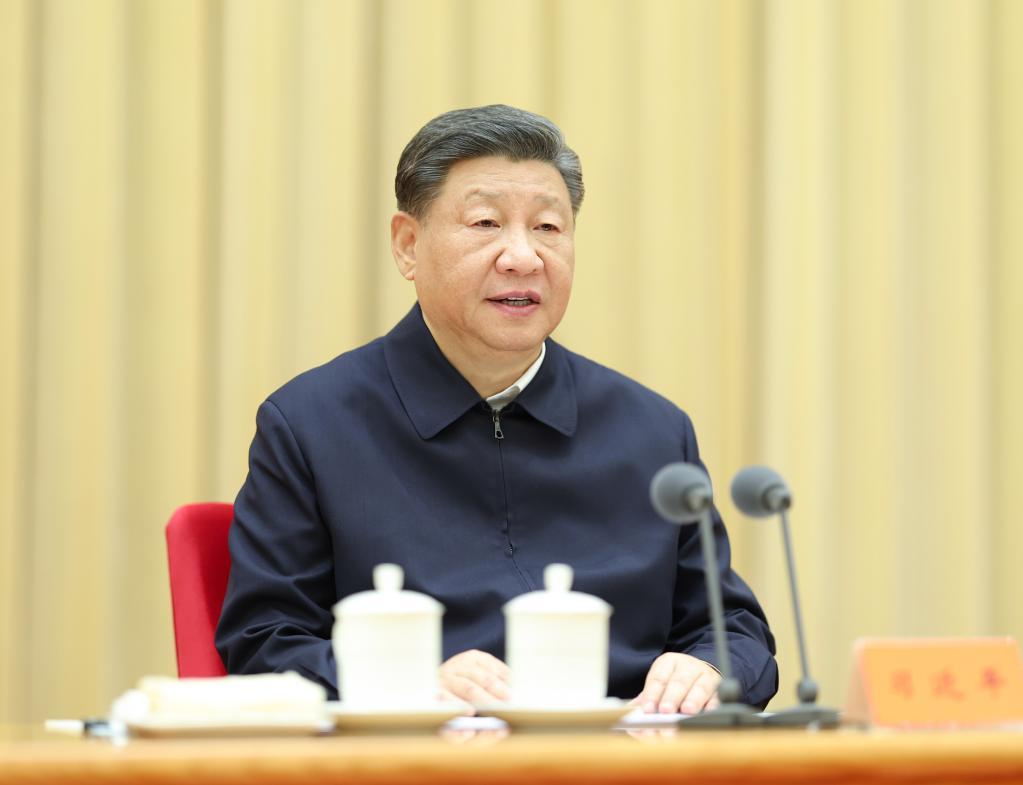
Xi Jinping, general secretary of the Communist Party of China Central Committee, Chinese president and chairman of the Central Military Commission, delivers an important speech at the Central Conference on Work Relating to Foreign Affairs in Beijing, capital of China. The conference was held in Beijing from Wednesday to Thursday. (Xinhua/Ju Peng)
BEIJING, Dec. 28 (Xinhua) -- The Central Conference on Work Relating to Foreign Affairs was held in Beijing from Wednesday to Thursday. Xi Jinping, general secretary of the Central Committee of the Communist Party of China (CPC), Chinese president and chairman of the Central Military Commission, attended the conference and delivered an important address.
Members of the Standing Committee of the Political Bureau of the CPC Central Committee Li Qiang, Zhao Leji, Wang Huning, Cai Qi, Ding Xuexiang and Li Xi, and Vice President Han Zheng attended the conference.
In his important address, Xi presented a systematic review of the historic achievements and valuable experience of major-country diplomacy with Chinese characteristics in the new era, gave a profound exposition on the international environment and historical mission of China's external work on the new journey, and made comprehensive plans for China's external work for the present and coming periods. Presiding over the conference, Li Qiang emphasized the importance of ensuring sound external work on the new journey under the guidance of Xi Jinping Thought on Diplomacy, and set out requirements for studying and implementing the guiding principles of General Secretary Xi Jinping's important address.
It was made clear at the conference that since the 18th CPC National Congress, historic achievements have been secured and historic changes have taken place in China's external work on the great journey of advancing the cause of socialism with Chinese characteristics in the new era. First, we have established and developed Xi Jinping Thought on Diplomacy, opening up new vistas in the theory and practice of China's diplomacy and providing the fundamental guideline for advancing major-country diplomacy with Chinese characteristics. Second, we have showcased distinct Chinese characteristics, style and ethos in our diplomacy, and established the image of a confident, self-reliant, open and inclusive major country with a global vision. Third, we have advocated the building of a community with a shared future for mankind, pointing the right direction for human society leading to common development, lasting peace and security, and mutual learning between civilizations. Fourth, we have followed the strategic guidance of head-of-state diplomacy, and played an increasingly important and constructive role in international affairs. Fifth, we have taken a holistic approach to our relations with all parties, with a view to fostering major-country dynamics featuring peaceful coexistence, overall stability and balanced development. Sixth, we have expanded a comprehensive strategic layout, and formed a wide-ranging, high-quality global network of partnerships. Seventh, we have advanced high-quality Belt and Road cooperation, and established the world's most broad-based and largest platform for international cooperation. Eighth, we have worked to both pursue development and safeguard security, and effectively upheld China's sovereignty, security and development interests with a firm will and an indomitable fighting spirit. Ninth, we have taken an active part in global governance, and shown the way in reforming the international system and order. Tenth, we have strengthened the centralized, unified leadership of the CPC Central Committee, and brought about greater coordination in China's external work.
It was underlined at the conference that in the decade of the new era, we have seen high winds and choppy waters and overcome various difficulties and challenges in China's external work. We have opened up new prospects in major-country diplomacy with Chinese characteristics, and gained much more strategic autonomy and initiative in our diplomacy. China has become a responsible major country with enhanced international influence, stronger capacity to steer new endeavors, and greater moral appeal.
It was pointed out at the conference that a range of valuable experience has been gained in the new era of Chinese diplomacy. It is imperative to uphold principles. On major issues concerning the future of humanity and the direction of the world, we must take a clear and firm position, hold the international moral high ground, and unite and rally the overwhelming majority in our world. It is imperative to shoulder China's responsibility as a major country. We need to advocate the spirit of independence, champion peaceful development, and promote global stability and prosperity. It is imperative to apply systems thinking. With a correct understanding of history and of the big picture, we must navigate the prevailing trends, adopt a coordinated approach, and seize the initiative. It is imperative to uphold fundamental principles and break new ground. We need to follow the fine tradition and fundamental direction of China's diplomacy, and at the same time work progressively for innovation in both theory and practice. It is imperative to carry forward our fighting spirit. We must reject all acts of power politics and bullying, and vigorously defend our national interests and dignity. It is imperative to leverage our institutional strengths. Under the centralized, unified leadership of the CPC Central Committee, all regions and all departments must coordinate with each other and build strong synergy.
It was noted at the conference that great transformation is accelerating across the world. Changes of the world, of our times, and of historical significance are unfolding like never before, and the world has entered a new period of turbulence and transformation. Yet the overall direction of human development and progress will not change, the overall dynamics of world history moving forward amid twists and turns will not change, and the overall trend toward a shared future for the international community will not change. We must have full confidence in these trends of historical impact.
It was highlighted at the conference that looking ahead, China faces new strategic opportunities in its development. On the new journey, major-country diplomacy with Chinese characteristics will enter a new stage where much more can be accomplished. We must focus on the central task of the CPC and the country, seek progress while maintaining stability, break new ground while upholding fundamental principles, and firmly safeguard China's sovereignty, security and development interests. We will explore new frontiers in China's diplomatic theory and practice, foster new dynamics in the relations between China and the world, and raise China's international influence, appeal and power to shape events to a new level. We will create a more favorable international environment and provide more solid strategic support for building China into a great modern socialist country in all respects and advancing the great rejuvenation of the Chinese nation on all fronts through the Chinese path to modernization.
It was pointed out at the conference that building a community with a shared future for mankind is the core tenet of Xi Jinping Thought on Diplomacy. It is how China proposes to solve the questions of what kind of world to build and how to build it based on our deepening understanding of the laws governing the development of human society. It reflects the Chinese Communists' worldview, perception of order, and values, accords with the common aspiration of people in all countries, and points the direction for the progress of world civilizations. It is also the noble goal pursued by China in conducting major-country diplomacy with Chinese characteristics for the new era. Since the dawn of this new era, building a community with a shared future for mankind has developed from a Chinese initiative to an international consensus, from a promising vision to substantive actions, and from a conceptual proposition to a scientific system. It has served as a glorious banner leading the progress of the times. In summary, in building a community with a shared future for mankind, the goal is to build an open, inclusive, clean and beautiful world of lasting peace, universal security and shared prosperity, the pathway is promoting global governance that features extensive consultation and joint contribution for shared benefit, the guiding principle is to apply the common values of humanity, the basic underpinning lies in building a new type of international relations, the strategic guidance comes from the implementation of the Global Development Initiative, the Global Security Initiative and the Global Civilization Initiative, and the platform for action is high-quality Belt and Road cooperation. On this basis, we seek to bring countries together to meet challenges and achieve prosperity for all, and usher in a bright future of peace, security, prosperity and progress for our world.
It was pointed out at the conference that given the series of major issues and challenges facing the world today, China calls for an equal and orderly multipolar world and a universally beneficial and inclusive economic globalization. An equal and orderly multipolar world is one in which all countries, regardless of size, are treated as equals, hegemonism and power politics are rejected, and democracy is truly promoted in international relations. To keep the progress toward greater multipolarity generally stable and constructive, the purposes and principles of the United Nations Charter must be observed by all, the universally recognized, basic norms governing international relations must be upheld by all, and true multilateralism must be practiced. A universally beneficial and inclusive economic globalization is one that meets the common needs of all countries, especially the developing countries, and properly addresses the development imbalances between and within countries resulting from the global allocation of resources. It is important to resolutely oppose the attempt to roll back globalization and abuse the concept of security, oppose all forms of unilateralism and protectionism, firmly promote trade and investment liberalization and facilitation, overcome the structural problems hindering the healthy development of the world economy, and make economic globalization more open, inclusive, balanced and beneficial to all.
It was made clear at the conference that in the current and upcoming periods, China's external work shall be guided by Xi Jinping Thought on Socialism with Chinese Characteristics for a New Era and Xi Jinping Thought on Diplomacy in particular. It should serve the goals and missions of Chinese modernization, and follow the principles of self-confidence and self-reliance, openness and inclusiveness, fairness and justice, and win-win cooperation. Focusing on the theme of building a community with a shared future for mankind, we need to strengthen strategic planning in sync with the changing times, deepen and improve our diplomatic layout, follow a problem-oriented approach, and apply a systematic way of thinking. We need to identify the strategic tasks of Chinese diplomacy in a more multi-dimensional and comprehensive manner. We need to act with a stronger sense of historical responsibility and a more vibrant spirit of innovation to make new headway in our major-country diplomacy with Chinese characteristics.
It was pointed out at the conference that upholding fundamental principles and breaking new ground in our external work is the natural requirement of making new headway in our major-country diplomacy with Chinese characteristics on the new journey, and of providing a stronger underpinning for Chinese modernization. It is important to strengthen the intellectual and theoretical competence of the foreign service, deepen reform of systems and institutions, promote the building of a contingent of personnel involved in foreign affairs, and continue to make our external work more science-based, forward-looking, proactive and innovative.
It was stressed at the conference that we must unswervingly uphold the CPC central leadership's ultimate authority over foreign affairs, conscientiously uphold the centralized, unified leadership of the CPC Central Committee, and further strengthen the systems and institutions for the CPC's leadership over external work. All localities and departments should keep in mind the big picture and coordinate with each other to implement the decisions and plans of the CPC Central Committee on our external work in both letter and spirit.
Wang Yi gave concluding remarks. Leading officials of the Publicity Department of the CPC Central Committee, the International Department of the CPC Central Committee, the Ministry of Commerce, the Joint Staff Department of the Central Military Commission and Yunnan Province, and a representative from the Permanent Mission of the People's Republic of China to the United Nations gave presentations at the conference.
Members of the Political Bureau of the CPC Central Committee and members of the Secretariat of the CPC Central Committee, leaders of the Standing Committee of the National People's Congress, State Councilors, President of the Supreme People's Court, Procurator General of the Supreme People's Procuratorate, and leaders of the National Committee of the Chinese People's Political Consultative Conference attended the conference.
Members of the Central Commission for Foreign Affairs, major officials of provinces, autonomous regions, municipalities directly under the Central Government, cities separately listed in the state plan, and the Xinjiang Production and Construction Corps, of the relevant departments of central CPC and state institutions, relevant people's organizations, relevant departments of the Central Military Commission, and of some financial institutions under the direct management of the Central Government, as well as Chinese ambassadors, ambassadorial-rank consuls general posted overseas and representatives to international organizations participated in the conference. ■
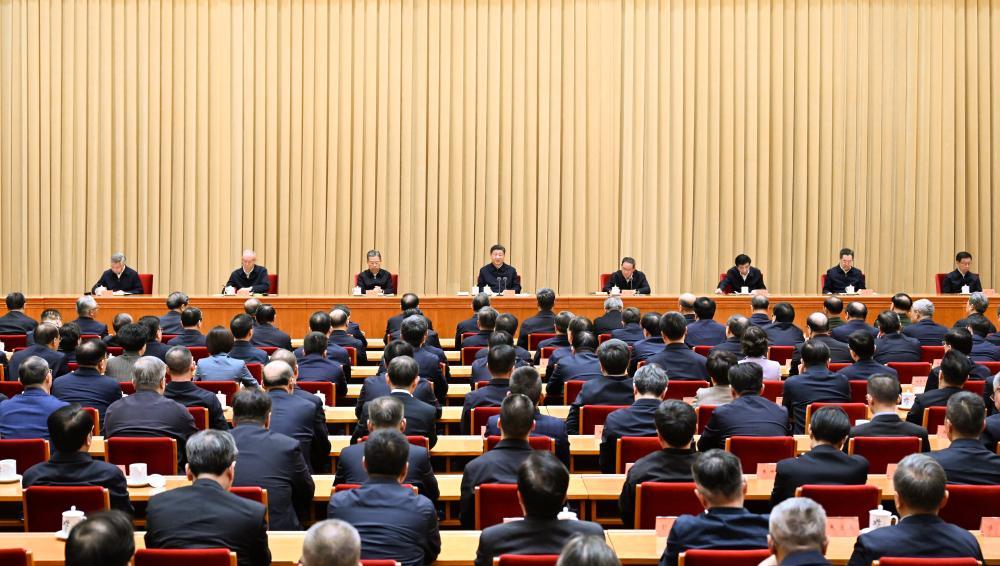
Xi Jinping, general secretary of the Communist Party of China Central Committee, Chinese president and chairman of the Central Military Commission, delivers an important speech at the Central Conference on Work Relating to Foreign Affairs in Beijing, capital of China. The conference was held in Beijing from Wednesday to Thursday. Li Qiang, Zhao Leji, Wang Huning, Cai Qi, Ding Xuexiang, Li Xi and Han Zheng attended the conference. (Xinhua/Xie Huanchi)
Chinese Foreign Minister Wang Yi, also a member of the Political Bureau of the Communist Party of China (CPC) Central Committee and director of the Office of the Foreign Affairs Commission of the CPC Central Committee, gives concluding remarks at the Central Conference on Work Relating to Foreign Affairs in Beijing, capital of China, Dec. 28, 2023. The conference was held in Beijing from Wednesday to Thursday. (Xinhua/Shen Hong)


